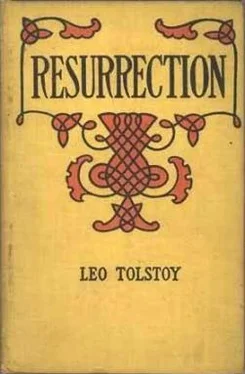Leo Tolstoy - Resurrection
Здесь есть возможность читать онлайн «Leo Tolstoy - Resurrection» весь текст электронной книги совершенно бесплатно (целиком полную версию без сокращений). В некоторых случаях можно слушать аудио, скачать через торрент в формате fb2 и присутствует краткое содержание. Жанр: Русская классическая проза, на английском языке. Описание произведения, (предисловие) а так же отзывы посетителей доступны на портале библиотеки ЛибКат.
- Название:Resurrection
- Автор:
- Жанр:
- Год:неизвестен
- ISBN:нет данных
- Рейтинг книги:4 / 5. Голосов: 1
-
Избранное:Добавить в избранное
- Отзывы:
-
Ваша оценка:
- 80
- 1
- 2
- 3
- 4
- 5
Resurrection: краткое содержание, описание и аннотация
Предлагаем к чтению аннотацию, описание, краткое содержание или предисловие (зависит от того, что написал сам автор книги «Resurrection»). Если вы не нашли необходимую информацию о книге — напишите в комментариях, мы постараемся отыскать её.
Resurrection — читать онлайн бесплатно полную книгу (весь текст) целиком
Ниже представлен текст книги, разбитый по страницам. Система сохранения места последней прочитанной страницы, позволяет с удобством читать онлайн бесплатно книгу «Resurrection», без необходимости каждый раз заново искать на чём Вы остановились. Поставьте закладку, и сможете в любой момент перейти на страницу, на которой закончили чтение.
Интервал:
Закладка:
“She is no relation of his?”
“No, but she is willing to marry him if that will enable her to remain with him.”
The General looked fixedly with twinkling eyes at his interlocutor, and, evidently with a wish to discomfit him, listened, smoking in silence.
When Nekhludoff had finished, the General took a book off the table, and, wetting his finger, quickly turned over the pages and found the statute relating to marriage.
“What is she sentenced to?” he asked, looking up from the book.
“She? To hard labour.”
“Well, then, the position of one sentenced to that cannot be bettered by marriage.”
“Yes, but—”
“Excuse me. Even if a free man should marry her, she would have to serve her term. The question in such cases is, whose is the heavier punishment, hers or his?”
“They are both sentenced to hard labour.”
“Very well; so they are quits,” said the General, with a laugh. “She’s got what he has, only as he is sick he may be left behind, and of course what can be done to lighten his fate shall be done. But as for her, even if she did marry him, she could not remain behind.”
“The Generaless is having her coffee,” the footman announced.
The General nodded and continued:
“However, I shall think about it. What are their names? Put them down here.”
Nekhludoff wrote down the names.
Nekhludoff’s request to be allowed to see the dying man the General answered by saying, “Neither can I do that. Of course I do not suspect you, but you take an interest in him and in the others, and you have money, and here with us anything can be done with money. I have been told to put down bribery. But how can I put down bribery when everybody takes bribes? And the lower their rank the more ready they are to be bribed. How can one find it out across more than three thousand miles? There any official is a little Tsar, just as I am here,” and he laughed. “You have in all likelihood been to see the political prisoners; you gave money and got permission to see them,” he said, with a smile. “Is it not so?”
“Yes, it is.”
“I quite understand that you had to do it. You pity a political prisoner and wish to see him. And the inspector or the convoy soldier accepts, because he has a salary of twice twenty copecks and a family, and he can’t help accepting it. In his place and yours I should have acted in the same way as you and he did. But in my position I do not permit myself to swerve an inch from the letter of the law, just because I am a man, and might be influenced by pity. But I am a member of the executive, and I have been placed in a position of trust on certain conditions, and these conditions I must carry out. Well, so this business is finished. And now let us hear what is going on in the metropolis.” And the General began questioning with the evident desire to hear the news and to show how very human he was.
XXIII
The sentence commuted.
“By—the-way, where are you staying?” asked the General as he was taking leave of Nekhludoff. “At Duke’s? Well, it’s horrid enough there. Come and dine with us at five o’clock. You speak English?”
“Yes, I do.”
“That’s good. You see, an English traveller has just arrived here. He is studying the question of transportation and examining the prisons of Siberia. Well, he is dining with us to-night, and you come and meet him. We dine at five, and my wife expects punctuality. Then I shall also give you an answer what to do about that woman, and perhaps it may be possible to leave some one behind with the sick prisoner.”
Having made his bow to the General, Nekhludoff drove to the post-office, feeling himself in an extremely animated and energetic frame of mind.
The post-office was a low-vaulted room. Several officials sat behind a counter serving the people, of whom there was quite a crowd. One official sat with his head bent to one side and kept stamping the envelopes, which he slipped dexterously under the stamp. Nekhludoff had not long to wait. As soon as he had given his name, everything that had come for him by post was at once handed to him. There was a good deal: letters, and money, and books, and the last number of Fatherland Notes. Nekhludoff took all these things to a wooden bench, on which a soldier with a book in his hand sat waiting for something, took the seat by his side, and began sorting the letters. Among them was one registered letter in a fine envelope, with a distinctly stamped bright red seal. He broke the seal, and seeing a letter from Selenin and some official paper inside the envelope, he felt the blood rush to his face, and his heart stood still. It was the answer to Katusha’s petition. What would that answer be? Nekhludoff glanced hurriedly through the letter, written in an illegibly small, hard, and cramped hand, and breathed a sigh of relief. The answer was a favourable one.
“Dear friend,” wrote Selenin, “our last talk has made a profound impression on me. You were right concerning Maslova. I looked carefully through the case, and see that shocking injustice has been done her. It could be remedied only by the Committee of Petitions before which you laid it. I managed to assist at the examination of the case, and I enclose herewith the copy of the mitigation of the sentence. Your aunt, the Countess Katerina Ivanovna, gave me the address which I am sending this to. The original document has been sent to the place where she was imprisoned before her trial, and will from there he probably sent at once to the principal Government office in Siberia. I hasten to communicate this glad news to you and warmly press your hand.
“Yours,
“Selenin.”The document ran thus: “His Majesty’s office for the reception of petitions, addressed to his Imperial name”—here followed the date——“by order of the chief of his Majesty’s office for the reception of petitions addressed to his Imperial name. The meschanka Katerina Maslova is hereby informed that his Imperial Majesty, with reference to her most loyal petition, condescending to her request, deigns to order that her sentence to hard labour should be commuted to one of exile to the less distant districts of Siberia.”
This was joyful and important news; all that Nekhludoff could have hoped for Katusha, and for himself also, had happened. It was true that the new position she was in brought new complications with it. While she was a convict, marriage with her could only be fictitious, and would have had no meaning except that he would have been in a position to alleviate her condition. And now there was nothing to prevent their living together, and Nekhludoff had not prepared himself for that. And, besides, what of her relations to Simonson? What was the meaning of her words yesterday? If she consented to a union with Simonson, would it be well? He could not unravel all these questions, and gave up thinking about it. “It will all clear itself up later on,” he thought; “I must not think about it now, but convey the glad news to her as soon as possible, and set her free.” He thought that the copy of the document he had received would suffice, so when he left the post-office he told the isvostchik to drive him to the prison.
Though he had received no order from the governor to visit the prison that morning, he knew by experience that it was easy to get from the subordinates what the higher officials would not grant, so now he meant to try and get into the prison to bring Katusha the joyful news, and perhaps to get her set free, and at the same time to inquire about Kryltzoff’s state of health, and tell him and Mary Pavlovna what the general had said. The prison inspector was a tall, imposing-looking man, with moustaches and whiskers that twisted towards the corners of his mouth. He received Nekhludoff very gravely, and told him plainly that he could not grant an outsider the permission to interview the prisoners without a special order from his chief. To Nekhludoff’s remark that he had been allowed to visit the prisoners even in the cities he answered:
Читать дальшеИнтервал:
Закладка:
Похожие книги на «Resurrection»
Представляем Вашему вниманию похожие книги на «Resurrection» списком для выбора. Мы отобрали схожую по названию и смыслу литературу в надежде предоставить читателям больше вариантов отыскать новые, интересные, ещё непрочитанные произведения.
Обсуждение, отзывы о книге «Resurrection» и просто собственные мнения читателей. Оставьте ваши комментарии, напишите, что Вы думаете о произведении, его смысле или главных героях. Укажите что конкретно понравилось, а что нет, и почему Вы так считаете.












